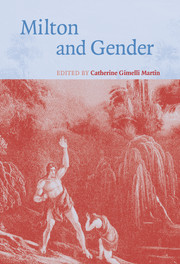Book contents
- Frontmatter
- Contents
- List of illustrations
- Notes on contributors
- Acknowledgments
- Abbreviations
- Introduction: Milton's gendered subjects
- PART I MASCULINITY, DIVORCE, AND MISOGYNY IN MILTON'S PROSE
- PART II THE GENDERED SUBJECTS OF MILTON'S MAJOR POEMS
- 4 The profession of virginity in A Maske Presented at Ludlow Castle
- 5 The genders of God and the redemption of the flesh in Paradise Lost
- 6 Transported touch: the fruit of marriage in Paradise Lost
- 7 The experience of defeat: Milton and some female contemporaries
- 8 Samson and surrogacy
- 9 “I was his nursling once”: nation, lactation, and the Hebraic in Samson Agonistes
- 10 “The Jewish Question” and “The Woman Question” in Samson Agonistes: gender, religion, and nation
- PART III GENDERED SUBJECTIVITY IN MILTON'S LITERARY HISTORY
- Index
6 - Transported touch: the fruit of marriage in Paradise Lost
Published online by Cambridge University Press: 22 September 2009
- Frontmatter
- Contents
- List of illustrations
- Notes on contributors
- Acknowledgments
- Abbreviations
- Introduction: Milton's gendered subjects
- PART I MASCULINITY, DIVORCE, AND MISOGYNY IN MILTON'S PROSE
- PART II THE GENDERED SUBJECTS OF MILTON'S MAJOR POEMS
- 4 The profession of virginity in A Maske Presented at Ludlow Castle
- 5 The genders of God and the redemption of the flesh in Paradise Lost
- 6 Transported touch: the fruit of marriage in Paradise Lost
- 7 The experience of defeat: Milton and some female contemporaries
- 8 Samson and surrogacy
- 9 “I was his nursling once”: nation, lactation, and the Hebraic in Samson Agonistes
- 10 “The Jewish Question” and “The Woman Question” in Samson Agonistes: gender, religion, and nation
- PART III GENDERED SUBJECTIVITY IN MILTON'S LITERARY HISTORY
- Index
Summary
Milton's unfinished, posthumously published theological treatise, De Doctrina Christiana, includes in its first book a chapter on “The Special Government of Man before the Fall: Dealing Also with the Sabbath and Marriage.” In what seems at times a catch-all for discussions that must not have fit anywhere else, Milton, or the compositor of this Miltonic treatise, sutures together in chapter 10 a consideration of the Edenic problem of the forbidden fruit, which naturally does belong in a chapter on the government of man before the fall, with considerations of the problems of divorce and polygamy, institutions that are only really relevant to the government of man after the fall. In the first two manuscript pages of this chapter in the De Doctrina, Milton forwards his most thoroughgoing theorization of God's commandment not to eat the fruit of the tree of knowledge. In eighteen subsequent manuscript pages, Milton confronts the possibility (a possibility taken seriously by many of his contemporaries) that God before the fall had issued another commandment, a marriage commandment that explicitly instituted the practice of marriage and implicitly prohibited the practices of divorce and polygamy, two institutions whose legality Milton had championed in the polemical divorce pamphlets of the previous decade.
When taken as a single unit of theological argument, this chapter makes little sense. Milton takes little care to connect the problems of the prohibition of the fruit with the complications of marriage law: the prohibition of the fruit was presumably to be obeyed without questioning, while the marriage commandment admitted, he argues at length, of numerous contingencies and escape clauses.
- Type
- Chapter
- Information
- Milton and Gender , pp. 115 - 132Publisher: Cambridge University PressPrint publication year: 2005

